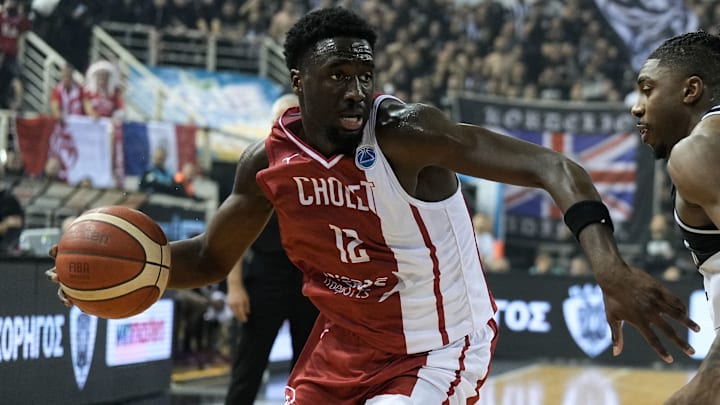With Landry Shamet seemingly favored to grab one of the New York Knicks’ final two roster spots, it allows us to read the tea leaves, and discern who their final signing will be.
It’s No. 51 pick Mohamed Diawara.
This is almost a default decision. By handing out another minimum for a veteran with two-plus years experience, like Shamet, the Knicks will only have room to offer a rookie-minimum deal to bring the roster up to 14 players.
We now know Kevin McCullar Jr. doesn’t qualify to receive that contract. He must be treated as a player with one year of service, despite spending all of last season on a two-way contract. That put his minimum salary at $2.05 million, which is nearly $800,000 above the rookie minimum.
It’s a fine margin that matters a great deal. Signing McCullar and Shamet would run a total of $4.4 million. The Knicks only have $3.7 million beneath the second apron. Without making a trade that sees them cut salary, they have to give the 14th roster slot to a rookie.
Mohamed Diawara is the painfully obvious choice for the Knicks
If we operate under the assumption that New York will sign Shamet, as SNY’s Ian Begley seems to be doing, Diawara is basically the sole option. People will turn it into a decision between him or James Nnaji. It’s not actually a decision at all.
Drafted No. 31 overall in 2023, the 6’11” Nnaji spent time with the Knicks during the Las Vegas Summer League. While the 7’5” wingspan is tantalizing, he remains incredibly raw, with not a lot of immediate upside. He fouled a ton, made minimal impact on offense, and didn’t leverage his size and length on the glass until his final outing against the Washington Wizards.
To be sure, Diawara isn’t a finished product himself. The comparisons he keeps drawing to OG Anunoby are wildly premature. But he showed a lot more during his own summer-league stint, including plenty of on-ball feel, and defensive playmaking. The athleticism pops, and at 6’9”, with a 7’4” wingspan, he has the chops to switch across almost every position.
That versatility should be the determining factor, if the Knicks need one at all. They are woefully light on wings after Anunoby, Mikal Bridges, and Josh Hart—especially if they don’t believe Pacome Dadiet is ready to sponge up semi-regular reps. The positional malleability afforded by Diawara can be an end-of-rotation weapon. He’s able to log minutes at the 2, 3, 4, and even situational time at the 5.
Nnaji doesn’t come close to offering the same level of optionality. He’s essentially a pure center, and the Knicks have their big-man minutes spoken for with Karl-Anthony Towns, Mitchell Robinson, and Ariel Huckporti on the payroll.
So barring any pivot in the team’s intentions with Shamet or plans on the trade market, New York’s final signing might as well be etched in stone. Diawara makes the most sense—and, frankly, it’s not even close.
